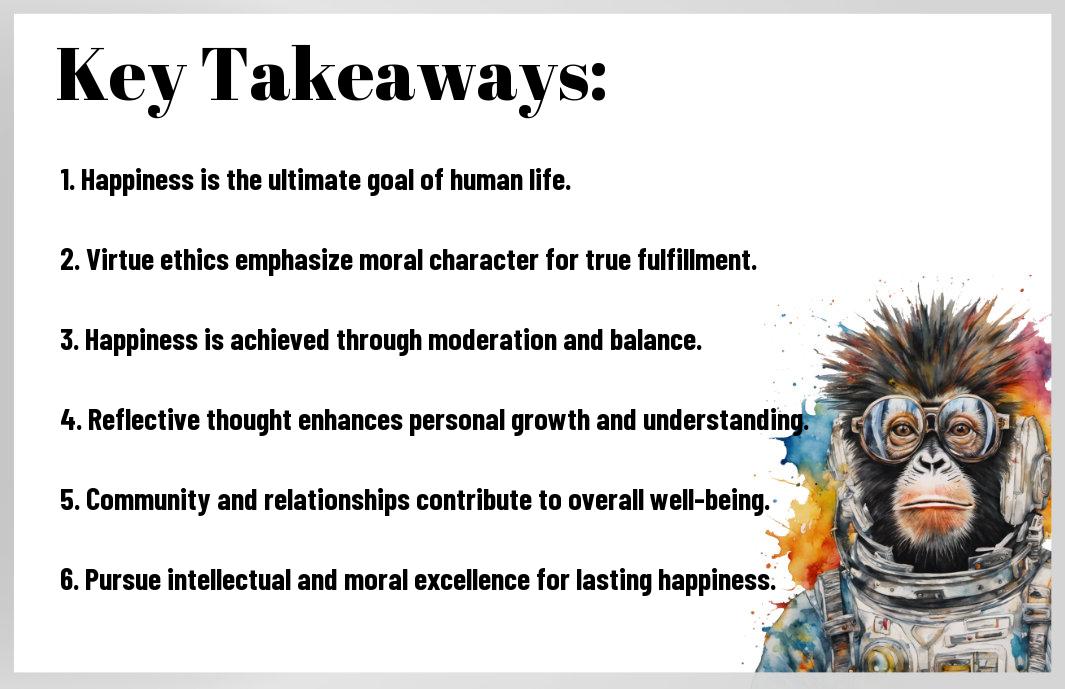
Newsletter Subscribe
Enter your email address below and subscribe to our newsletter

Enter your email address below and subscribe to our newsletter

It’s fascinating to explore how ancient wisdom still resonates with us today. When I probe into Aristotle’s teachings, I find that his insights on happiness offer a timeless guide to living a fulfilling life. In this post, I will share key concepts from Aristotle’s philosophy that can help you uncover your true happiness. Whether you’re seeking personal growth or simply want to feel more content, understanding his perspective can enlighten your journey to joy.


Your journey toward happiness can often feel overwhelming, filled with questions about what it truly means to be happy. Aristotle, however, offers a refreshingly clear perspective with his concept of eudaimonia, which is often translated as ‘flourishing’ or ‘the good life.’ To him, happiness isn’t merely about fleeting pleasures but rather about living a fulfilled and meaningful life. It’s about reaching your potential and engaging with the world in a way that reflects your true self. This deeper understanding shifts the focus from temporary satisfaction to a more profound state of being that encompasses our overall development and well-being.
To grasp what Aristotle meant by eudaimonia, it’s crucial to realize that it extends beyond mere joy or contentment. Eudaimonia signifies living in accordance with virtue, achieving one’s true nature, and realizing personal excellence. It involves an ongoing endeavor to lead a life characterized by reason, wise decision-making, and moral integrity. Therefore, as you explore the path to happiness, you might ask yourself how you can cultivate this deeper sense of fulfillment that Aristotle champions.
Across Aristotle’s work, you will find that virtue plays a pivotal role in achieving eudaimonia. For him, virtues are not just traits; they are habits that shape our character and influence our actions. By practicing virtues such as courage, temperance, and justice, you cultivate a character that aligns with your true self, fostering a genuine sense of happiness. This idea suggests that as you grow your virtues, you also enhance your ability to navigate life’s challenges, leading to more rewarding experiences.
Also, it’s important to highlight that Aristotle emphasizes the balance involved in virtue. He believed that virtue exists in finding the mean between excess and deficiency. For example, courage is a virtue that sits between the extremes of recklessness and cowardice. By striving for this balance in your character, you not only improve your moral stance but also create pathways for deeper happiness and fulfillment in your life. It’s through this ongoing development of your virtues that you can thrive and flourish as an individual, ultimately reaching your eudaimonia.
The essence of Aristotle’s idea of the Golden Mean is all about finding balance in our lives. It’s fascinating how he emphasizes that virtue lies between deficiency and excess. It’s easy to get caught up in extremes—whether that’s too much work or too little, extreme exercise, or being altogether inactive. I believe that identifying what lies in the middle can lead us to a more fulfilling and harmonious existence. This approach encourages us to evaluate our behaviors and choices, allowing us to strive for equilibrium, which is where true happiness often resides.
Golden opportunities for balance can be found in all areas of life, including our relationships, career, and personal development. When we aim for moderation, we not only cultivate better habits but also enhance our overall well-being. For example, think about social interactions—spending time with friends is imperative, but it’s equally important to carve out time for yourself. I feel that striking this balance can lead to a more satisfying and enriched life. It’s all about finding what feels right for you and adapting along the way.
Mean values serve us well in real-life situations, especially when trying to apply Aristotle’s teachings. If you consider aspects like work and leisure, we can easily see how practicing moderation can lead to better outcomes. Often, individuals who overwork themselves may experience burnout, while those who lean too far into leisure might struggle with productivity. By aiming for that sweet spot—where you can enjoy your downtime without sacrificing your professional goals—you create a more sustainable lifestyle.
And as we think about applying the Golden Mean, it can genuinely transform our approach to everyday decisions. Whether it’s accepting just the right amount of responsibility at work or indulging in hobbies without allowing them to consume all your time, practice help us hone our sense of balance. By being mindful of our actions and continually adjusting to our circumstances, we can cultivate a life that is not only productive but also immensely rewarding. This journey towards balance is not something that happens overnight, but instead, it requires persistence and reflection for us to thrive.
After delving into Aristotle’s perspective on happiness, it becomes clear that our relationships and sense of community play a significant role in our overall well-being. Aristotle believed that we are inherently social beings, and this notion resonates deeply with my experience. True happiness isn’t just a solitary pursuit; it’s deeply intertwined with the connections we cultivate and the communities we build. By nurturing relationships and participating in communal activities, I find that my sense of happiness grows in ways I wouldn’t have imagined alone.
Between friends and family, the shared moments enhance our individual experiences. It’s in laughter, support, and understanding that we find fulfillment unlike anything else. Aristotle posited that happiness is best achieved in the company of others, and I wholeheartedly agree. Every time I celebrate achievements or navigate challenges with loved ones, I am reminded of happiness as a collective experience. It’s those shared triumphs and mutual support that not only lift my spirits but also deepen my appreciation for life itself.
Along this journey of self-discovery, I’ve realized that the quality of my relationships directly impacts my happiness. Engaging authentically with others—whether it’s a meaningful conversation with a close friend or participating in community events—allows me to create bonds that are rich and fulfilling. Each connection I foster feeds my soul and adds depth to my understanding of happiness. I have found that it’s not about having a large number of acquaintances but rather fostering a handful of connections that genuinely resonate with me.
Another important aspect of building meaningful connections lies in vulnerability. When I open up to others about my experiences, struggles, and dreams, it encourages them to do the same. This exchange creates a powerful bond that enhances not just our relationships, but also our collective experience of happiness. It’s about creating a space where we can uplift each other, finding strength in our shared humanity. By investing in these meaningful connections, I’m continuously reminded of the wealth of joy that comes from being part of something greater than myself.
For Aristotle, the pursuit of knowledge and wisdom is not just an academic endeavor but a vital component of achieving true happiness. He believed that our capacity for rational thought sets us apart and should be utilized to its fullest extent. By engaging with the world around us—examining our experiences, learning from others, and seeking deeper understanding—we create pathways to a more fulfilling life. Each piece of knowledge we acquire adds a layer to our existence, enriching our perceptions and enabling us to navigate life’s complexities with greater ease.
Beside cultivating our intellect, lifelong learning can transform our daily experiences into a source of joy. Whenever I embrace new lessons, whether through formal education or illuminating conversations, I feel a spark of happiness that ignites my curiosity. This act of continuously seeking knowledge fosters a dynamic environment where I can grow, adapt, and thrive. You might find that as you learn, the world opens up in fascinating ways, showcasing the beauty and complexity of human existence.
Path takes us to the significance of self-reflection. Engaging in introspection allows us to review our thoughts, actions, and experiences, guiding us toward personal development and deeper happiness. When I pause to reflect on my life, I find clarity in my goals and desires; it’s a way to connect with my true self. Each moment of self-reflection serves to illuminate my values, aspirations, and areas that require growth. By understanding my trajectory, I can align my actions with my authentic self, leading to a more harmonious existence.
Also, the process of self-reflection cultivates awareness and understanding of both successes and failures. As I review past experiences, I am often reminded of valuable lessons that inform my future decisions. This cycle of learning from what I have done right or wrong empowers me to make choices that are more aligned with my values, ultimately paving the way for a deeper sense of contentment in my life. Regularly taking time to reflect not only nurtures my personal growth but reminds me that happiness is an evolving journey, deeply intertwined with the knowledge I continuously gain.

Unlike the idea that happiness arrives on a silver platter, true happiness often involves navigating through challenges that life throws our way. It’s easy to think that once certain conditions are met—like career success or financial security—happiness will follow. However, Aristotle encourages us to look deeper and realize that true fulfillment lies in our ability to confront and transcend these obstacles. By understanding the nature of our hurdles, we can harness our inner strengths to cultivate genuine happiness and resilience.
After reflecting on my life, I’ve come to understand that recognizing personal challenges is the first step toward overcoming them. Whether it’s dealing with self-doubt, external pressures, or the fear of failure, acknowledging these issues allows us to develop a clearer path toward happiness. I invite you to take a moment to consider what obstacles are currently hindering your pursuit of joy. Once you can identify these challenges, you gain the power to approach them with intention and purpose.
Before entering into strategies for resilience, I find it helpful to appreciate that resilience is a skill that can be developed over time. Life will inevitably present us with setbacks, but it’s how we respond to these challenges that shapes our happiness. You can start by setting small, achievable goals each day that help build your sense of accomplishment. Cultivating a supportive social network is also necessary—surrounding myself with uplifting friends and loved ones has made a significant difference in my ability to bounce back from difficulties.
At the core of developing resilience is the practice of mindfulness and self-compassion. I often find that taking time to reflect on my feelings, without judgment, fosters a more accepting attitude towards my struggles. Additionally, engaging in activities that bring me joy—whether that’s indulging in my favorite hobbies or simply taking a walk in nature—helps to re-energize my spirit. By nurturing these practices, I’ve become more adept at maneuvering through life’s obstacles, ultimately paving my way toward lasting happiness.
Despite the common perception that happiness is an end goal, Aristotle reminds us that it is more of a continuous journey. This perspective invites us to engage fully in the process of living rather than just chasing after a fleeting state of joy. It’s about cultivating a sense of fulfillment in the everyday actions and decisions we make, seeing them as steps along the path toward a truly happy life. When I embrace this notion, I find myself more open to experiences and less burdened by expectations of where I should be at any given moment.
By taking the time to appreciate the small things, I cultivate a richer understanding of what happiness really means. Each moment becomes an opportunity for growth and reflection, which enhances my journey. It’s in the daily practices—whether it’s a morning ritual or a task at work—that I find richness and depth in my existence. I remind myself that it’s not always about achieving grand milestones but rather about establishing a sense of purpose and engagement in every day.
Moments can often be fleeting, but they hold immense potential for happiness if I am willing to notice them. I find joy in the laughter I share with friends, the warmth of a sunny day, or even a quiet moment spent with a good book. These seemingly small details are what fill my life with happiness. Rather than waiting for something big to happen, I allow myself to revel in these simple pleasures, which ultimately enrich my journey. Learning to savor these moments has shifted my perspective on joy, making me realize that it is always within reach if I choose to look for it.
Journeying through life, I am discovering that each moment has its own unique beauty. Whether it’s the aroma of freshly brewed coffee in the morning or the warmth of a hug from a loved one, I find that these experiences create layers of happiness. Along the way, I’ve learned to cultivate gratitude for the mundane, understanding that true joy often blossoms from the simplest interactions. It’s not about seeking grand accomplishments; instead, it’s about appreciating the rhythm of daily life and allowing happiness to flourish in its many forms.
Upon reflecting on the essence of true happiness according to Aristotle, I find it enlightening to consider how happiness is intertwined with our actions and virtues. Aristotle emphasizes that happiness is not merely a fleeting emotion but rather the result of living a life aligned with our values and practicing virtues consistently. This deeper understanding inspires me to examine my own life and strive for a balance between my passions and responsibilities. By engaging in activities that promote my personal growth and aligning my actions with my moral compass, I can move closer to achieving my own sense of fulfillment.
Furthermore, I encourage you to explore more about Aristotle’s insights through the Notes on Aristotle’s Nicomachean Ethics. By reflecting on his teachings, I believe we can all discover that happiness is attainable when we cultivate a life of purpose, seek wisdom, and nurture our relationships with others. Ultimately, as you begin on your journey toward true happiness, let your actions illuminate the path to a more meaningful existence.
A: In Aristotle’s philosophy, true happiness, or “eudaimonia,” is the ultimate goal of human life. It goes beyond mere pleasure or transient joy and is associated with living a life of virtue and purpose. For Aristotle, happiness is achieved through the fulfillment of human potential and the cultivation of moral and intellectual virtues.
A: Aristotle defines virtue as a trait of character manifested in habitual action that lies between excess and deficiency. Virtues are necessary for achieving true happiness because they enable individuals to act in accordance with reason, leading to a well-balanced and fulfilling life. Each virtue represents a mean, and by practicing virtue, individuals cultivate habits that contribute to their overall happiness.
A: Rationality plays a central role in Aristotle’s conception of happiness. He asserts that human beings are rational creatures, and the exercise of reason is necessary for achieving eudaimonia. By using reason to guide their choices, individuals can make wise decisions that align with their values and virtues, ultimately leading to a more meaningful and happy life.
A: Community is vital in Aristotle’s understanding of happiness. He believes that humans are social beings and that true happiness is often found in relationships with others. Engaging in a community allows individuals to practice virtues, form friendships, and contribute to the common good. Therefore, social interactions and communal life are significant contributors to achieving eudaimonia.
A: Practical wisdom, or “phronesis,” is a key component of Aristotle’s ethical framework. It refers to the ability to make sound judgments and decisions that lead to virtuous actions. Practical wisdom enables individuals to navigate complex situations and apply moral virtues effectively. By developing practical wisdom, people can achieve a better understanding of how to reach true happiness through ethical living.
A: While Aristotle acknowledges that external goods, such as wealth, health, and friendships, can contribute to happiness, he emphasizes that they are not sufficient on their own. True happiness relies more heavily on the development of virtue and the quality of one’s character. External goods can enhance one’s ability to practice virtue, but they are not the ultimate source of happiness.
A: Individuals can apply Aristotle’s teachings by striving to cultivate personal virtues such as courage, temperance, and justice in their daily actions. Setting goals that align with one’s values, engaging in community activities, and practicing practical wisdom are practical steps towards achieving eudaimonia. Additionally, self-reflection and focusing on developing meaningful relationships can enhance one’s overall happiness and fulfillment.